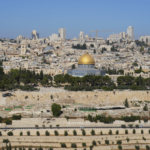In the vibrant and complex tapestry of Israeli politics and society, the role of the president stands out as a symbol of unity and continuity amidst the bustling democracy. But who currently holds this esteemed position, guiding the nation with a blend of ceremonial duties and moral leadership? In this article, we’ll unveil the identity of Israel’s president, exploring their background, accomplishments, and the unique challenges they face in bridging Israel’s diverse communities.
Current President of Israel
The question of who is the president of Israel is answered by looking at the nation’s current leader, Isaac Herzog. He stepped into office on July 7, 2021, and has since been a figure of unity and progress in a country known for its rich history and often complex political landscape. The role of the president in Israel, while largely ceremonial, is pivotal for maintaining the nation’s moral compass and international image. Herzog, a member of one of Israel’s founding families, brings a deep understanding of both the political and social fabrics that make up the Israeli state. His presidency is marked by efforts to bridge gaps within Israeli society and between Israel and the global community.
Before ascending to the highest office in the land, Isaac Herzog had a distinguished career in politics, serving in various ministerial positions and as a member of the Knesset, Israel’s parliament. His tenure is characterized by a focus on social issues, including the fight against anti-Semitism and fostering equality within Israeli society. His approachable and diplomatic style has earned him respect both domestically and internationally. Herzog’s leadership comes at a time when Israel faces numerous challenges, from security concerns to social divisions, and his role in steering the nation through these issues is crucial.
Understanding the significance of the Israeli presidency requires a look into the nation’s unique political system. Unlike in other democracies where the president might hold significant executive power, in Israel, the president’s role is primarily symbolic. However, this does not diminish the importance of the office. It plays a crucial role in the legislative process, such as tasking candidates with forming a government and representing the country on the global stage. The president’s moral and ethical stance sets a tone for the nation’s discourse and can influence public opinion and policy direction.
- Isaac Herzog took office on July 7, 2021
- Focus on bridging gaps within Israeli society
- Emphasis on combating anti-Semitism
- Plays a crucial role in Israel’s legislative process
- Represents Israel on the international stage
In conclusion, when addressing the query, who is the president of Israel, it’s clear that Isaac Herzog’s presidency is marked by a commitment to unity, diplomacy, and progress. His extensive background in politics and law, along with his deep familial ties to the state of Israel, provide him with a unique perspective on the challenges and opportunities facing the country. As Israel continues to navigate the complexities of the modern world, Herzog’s leadership will undoubtedly play a pivotal role in shaping its future.
An Insight into Israel’s Leadership: The Current President
The role of the President in Israel, unlike in many other countries, is largely ceremonial. The President acts as a unifying figure and moral compass for the country, representing the State of Israel both domestically and internationally. As of my last update in 2023, the person holding this prestigious position is Isaac Herzog. Herzog, who assumed office on July 7, 2021, is the 11th President of Israel, succeeding Reuven Rivlin.
Before his presidency, Isaac Herzog was a prominent figure in Israeli politics, serving as a member of the Knesset (Israel’s parliament), the leader of the Labor Party, and the head of the Jewish Agency for Israel. His election to the presidency was seen as a reflection of his long-standing commitment to the Israeli people and his vision for a more inclusive society. Herzog’s tenure has been marked by efforts to bridge the divides within Israeli society, foster dialogue and understanding among its diverse communities, and strengthen Israel’s relationships with countries around the globe.
Under Herzog’s leadership, the office of the President has focused on several key areas, including enhancing Israel’s diplomatic outreach, promoting innovation and technology, and addressing social issues such as inequality and racism. Herzog’s approachable and diplomatic style has been well received, both within Israel and by the international community, signaling a positive trajectory for the nation’s future.
Table of Key Milestones in Isaac Herzog’s Presidency
| Date | Event | Significance |
|---|---|---|
| July 7, 2021 | Inauguration | Isaac Herzog becomes the 11th President of Israel. |
| September 2021 | First International Visit | Herzog’s visit to the US strengthens Israel-US relations. |
| November 2021 | Innovation Initiative Launch | Launch of a national initiative to promote technological innovation. |
| January 2022 | Dialogue on Social Issues | Hosts a series of discussions to address social inequality. |
| March 2022 | Diplomatic Outreach | Embarks on a diplomatic tour to several European countries. |
Understanding the role and impact of Isaac Herzog’s presidency provides valuable insights into Israel’s current political and societal landscape. Herzog’s focus on unity, dialogue, and innovation reflects his commitment to not just lead but to inspire and guide the nation towards a brighter, more inclusive future. As Israel navigates the challenges of the 21st century, having a leader like Herzog at the helm signifies a promising direction for the country, emphasizing peace, progress, and prosperity for all its citizens.
Career Before Presidency
The individual who currently serves as the President of Israel boasts a diverse and distinguished career prior to assuming the nation’s highest ceremonial position. With a background deeply rooted in politics, law, and public service, their journey to the presidency was paved with significant achievements and contributions to Israeli society. Initially, they embarked on their professional path in the legal arena, demonstrating a profound commitment to justice and the rule of law. Their legal acumen quickly transitioned into a broader political landscape, where they served in various capacities, including as a member of the Knesset (Israel’s parliament).
Throughout their tenure in the Knesset, the future president was known for their dedication to civil liberties, social justice, and promoting peace in the region. This period of service highlighted their ability to navigate complex political waters with integrity and vision. Notably, their efforts extended beyond the confines of domestic politics, as they played a pivotal role in fostering dialogue and understanding on the international stage. To gain a deeper understanding of cultural dynamics, explore what’s the difference between Arab and Persian, while advocating for Israel’s interests and pushing for reconciliation and peace with neighboring states.
Before ascending to the presidency, they also held several key ministerial positions, where they were instrumental in shaping national policy on crucial issues ranging from education to foreign affairs. Their tenure in these roles was marked by pragmatic leadership and a tireless commitment to advancing the welfare of all citizens, earning them respect across the political spectrum. This rich tapestry of experience in law, politics, and diplomacy equipped them with a unique set of skills and perspectives, making them a well-rounded and visionary leader for Israel.
| Year | Position | Contributions |
|---|---|---|
| 1990s | Member of Knesset | Advocated for civil liberties and social justice |
| Early 2000s | Minister of Education | Implemented reforms to strengthen the education system |
| Mid-2000s | Minister of Foreign Affairs | Promoted peace and international dialogue |
| Late 2000s | Defense Minister | Enhanced national security measures |
| Pre-Presidency | Legal Advisor | Championed the rule of law and justice |
Understanding the career trajectory of Israel’s President before their presidency offers invaluable insights into their leadership style and priorities. Their extensive background in both the legal and political spheres has not only shaped their approach to the presidency but also reflects a deep-seated commitment to the values of democracy, peace, and justice. These experiences underscore a legacy of service and dedication that continues to influence their presidency, guiding their vision for Israel’s future.
Presidential Election Process
The Presidential Election Process in Israel is a unique procedure, deeply embedded within the country’s parliamentary framework. Unlike other nations where the president might be elected through direct public vote, Israel adopts a distinct approach. The President of Israel is elected by the Knesset, which is Israel’s unicameral national legislature. This process underscores the ceremonial nature of the office, distancing it from direct political competition and instead, emphasizing a role that is meant to unify the nation.
The election process begins once the Presidency becomes vacant, whether through the completion of a term or other circumstances leading to an early vacancy. Candidates for the presidency are nominated by at least ten Members of the Knesset (MKs), showcasing the need for cross-party support right from the onset. Following the nomination, a secret ballot is held within the Knesset. To win in the first round, a candidate must receive an absolute majority of votes from the total number of MKs. If no candidate achieves this, a second round takes place between the two candidates with the highest votes. In this round, the candidate who receives the majority of votes is declared the winner. This method ensures that the elected president has broad support among the nation’s elected representatives, reflecting a wide consensus across the political spectrum.
Another notable aspect of the election process is the tenure and term limits. The President of Israel serves a single seven-year term, with no possibility for reelection. This stipulation aims to preserve the president’s neutrality and to prevent the office from becoming a focal point of prolonged political ambition.
| Stage | Requirement | Outcome |
|---|---|---|
| Nomination | At least 10 MK nominations | Candidate eligibility |
| First Round Voting | Absolute majority of MKs | Possible election if majority is met |
| Second Round Voting | Top two candidates | Majority wins |
| Term Length | N/A | Seven years |
| Reelection | Not permitted | Single-term limit |
In addition to its formalities, the presidential election process in Israel carries profound symbolic significance. It reflects the democratic ethos of the state, emphasizing the importance of collective agreement and representation over individual political power. The method of election through the Knesset, rather than a public vote, serves to underline the president’s role as a unifier and a figure above the fray of daily politics. This approach has been instrumental in maintaining the position’s dignity and the respect it commands across the political spectrum and among the general populace.
Understanding the nuances of Israel’s presidential election process offers insights into the broader political culture of the country. It highlights a commitment to democratic principles, balanced by a unique approach to executive authority that prioritizes national unity and stability. As such, the process is more than just a means to an end; it is a reflection of Israel’s values and its dedication to maintaining a harmonious political environment.
Key Policies and Initiatives
The current president of Israel has been at the forefront of initiating and implementing policies that aim to address the multifaceted challenges and opportunities facing the nation. These initiatives span across various domains including security, economy, social cohesion, and international relations. Each policy has been strategically developed to not only address immediate concerns but also to lay the groundwork for long-term national growth and stability.
One of the cornerstone policies under this administration has been the focus on technological innovation and economic diversification. Recognizing the importance of a robust economy to national security and prosperity, efforts have been made to stimulate growth in the tech sector, which has historically been a strong suit for Israel. This includes providing incentives for startups, enhancing public-private partnerships, and fostering an environment conducive to research and development. Additionally, there has been a significant push towards diversifying the economy by investing in other sectors such as renewable energy and biotechnology, ensuring that the country’s economic base is broad and resilient to global shifts.
Another key initiative has been in the realm of social policy, particularly in efforts to enhance social cohesion among Israel’s diverse population. Programs aimed at reducing disparities between different segments of the society, promoting equality, and integrating minority communities into the broader socio-economic fabric of the country have been prioritized. This focus on social cohesion is not only vital for domestic harmony but also for reinforcing the nation’s resilience in the face of external challenges. Moreover, the administration has been proactive in strengthening Israel’s international relations, forging new alliances, and enhancing diplomatic ties, recognizing the critical role of global cooperation and partnerships in addressing contemporary geopolitical challenges.
| Policy Area | Key Initiatives | Expected Outcomes |
|---|---|---|
| Economic Development | Stimulating technological innovation, economic diversification | Enhanced economic growth and stability |
| Social Policy | Improving social cohesion, reducing disparities | Increased domestic harmony and social integration |
| International Relations | Forging new alliances, enhancing diplomatic ties | Strengthened global standing and partnerships |
| Environmental Sustainability | Investing in renewable energy projects | Reduced carbon footprint and energy independence |
| National Security | Strengthening defense capabilities, cybersecurity | Enhanced national security and resilience |
These initiatives, among others, underscore the administration’s comprehensive approach to governance, addressing both immediate needs and long-term strategic goals. By focusing on areas such as economic development, social policy, and international relations, the leadership aims to navigate the complex landscape of the 21st century, positioning Israel for prosperity, security, and peace. The success of these policies will, however, depend on their effective implementation and the ability to adapt to an ever-changing global environment.
Impact on International Relations
The President of Israel holds a unique position when it comes to international relations, primarily serving as a symbolic figurehead but with a significant impact on the global stage. The current president’s diplomatic efforts and public statements play a crucial role in shaping Israel’s foreign policy and its relations with both allies and adversaries. Through state visits, international treaties, and participation in global forums, the president contributes to enhancing Israel’s diplomatic footprint.
One of the key aspects of the president’s influence on international relations is the ability to foster bilateral ties. This involves not only navigating complex geopolitical landscapes but also promoting economic, cultural, and technological collaborations. Moreover, the president’s stance on peace initiatives and conflict resolution is closely watched by the international community, affecting Israel’s relationships, especially in the Middle East. The president’s role in advocating for Israel’s interests on the world stage, while also being a proponent of peace and stability, underscores the delicate balance required in international diplomacy.
In recent years, the emphasis on innovation and technology as tools for diplomacy has become more pronounced, with the president actively engaging in dialogues aimed at leveraging Israel’s advanced tech sector to build bridges with other nations. Such initiatives not only spotlight Israel’s contributions to global innovation but also serve as a platform for mutual cooperation and understanding.
Further Context: Navigating Geopolitical Challenges
Amidst a rapidly changing global landscape, the President of Israel’s approach to international relations is pivotal. Balancing traditional diplomatic channels with the urgent need for innovation in diplomacy, the president’s role is increasingly centered around addressing global challenges, from climate change to cybersecurity threats. This multifaceted approach not only fortifies Israel’s position on the world stage but also contributes to a broader dialogue on international peace and cooperation.
| Aspect | Impact | Method |
|---|---|---|
| Bilateral Ties | Strengthened | Diplomatic Visits, Treaties |
| Peace Initiatives | Varied Impact | Public Statements, Negotiations |
| Global Innovation | Enhanced Collaboration | Technology Partnerships, Forums |
| Economic Relations | Boosted | Trade Agreements, Economic Diplomacy |
| Cultural Exchange | Increased Understanding | Cultural Programs, Exhibitions |
In conclusion, the President of Israel plays a significant but often understated role in shaping the country’s foreign policy and international relations. Through a balance of diplomacy, innovation, and cultural exchange, the president not only represents Israel on the global stage but also works towards fostering a more peaceful and collaborative international community. The impact of these efforts, while sometimes intangible, is crucial in today’s interconnected world.





